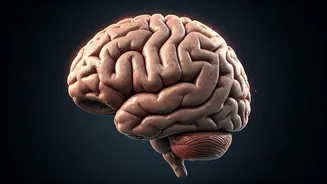Brain's Waste Disposal
The human brain, though incredibly complex, is constantly engaged in internal housekeeping, including the crucial task of eliminating waste products. Unlike
other organs, the brain lacks a conventional lymphatic system for waste removal. Instead, it relies on the glymphatic system, a network that functions primarily during sleep. This system involves cerebrospinal fluid flushing through the brain tissue, effectively washing away toxins and metabolic byproducts. Without efficient waste removal, these substances can accumulate, potentially impairing brain function and contributing to various neurological issues. Sleep deprivation directly impacts the efficiency of the glymphatic system, which may be one of the reasons for impaired cognitive abilities in sleep-deprived individuals.
Sleep & Cognitive Function
A significant consequence of sleep deprivation is diminished cognitive function. This is not merely a matter of feeling tired; it affects crucial aspects of thinking, including attention, memory, and decision-making. Research indicates that during sleep, the brain consolidates memories, strengthens neural connections, and prepares for optimal performance the next day. When sleep is inadequate, these processes are disrupted. The brain struggles to function effectively, leading to issues with focus, information processing, and overall cognitive acuity. Consequently, a lack of quality sleep significantly impairs an individual's ability to perform tasks requiring mental agility and concentration, making it difficult to function effectively in daily life.
Glymphatic System's Role
The glymphatic system, primarily active during sleep, plays a key role in clearing out the brain's metabolic waste. When we sleep, the brain cells shrink, which creates more space for the cerebrospinal fluid to flow through. This fluid then washes away harmful proteins like amyloid-beta, which is associated with Alzheimer's disease. Inadequate sleep, therefore, hinders the glymphatic system's efficiency, causing a build-up of waste in the brain. This build-up may trigger inflammation and neurological damage, leading to cognitive issues. Furthermore, the brain prioritizes waste removal during sleep, which could explain the cognitive deficits often observed when sleep-deprived as the brain shifts resources towards waste clearance rather than cognitive tasks.
Why Attention Suffers
The inability to pay attention when sleep-deprived may be a sign that the brain is prioritizing waste removal. The brain has limited resources, and when sleep is cut short, it might redirect those resources towards clearing out toxins instead of focusing on tasks that require attention. This reallocation is a survival mechanism. This shift in focus is a biological trade-off: The brain chooses to clean itself, even if it means sacrificing some cognitive functions, like paying attention. This underscores the fundamental importance of sleep for not only maintaining cognitive abilities but also for preserving overall brain health and preventing potential neurological damage related to accumulated waste.
Implications & Future Research
The findings underscore the intricate relationship between sleep, brain health, and cognitive performance. Understanding the glymphatic system's role in waste removal offers potential avenues for therapeutic interventions for sleep disorders and neurological conditions. Furthermore, this research highlights the importance of consistent, high-quality sleep for cognitive well-being. Future research may focus on how we can optimize the glymphatic system's function, potentially by improving sleep quality. This could involve exploring lifestyle modifications, such as regular sleep schedules, or developing targeted therapies to improve brain waste clearance. Further exploration in this area is expected to unlock even more profound insights.













